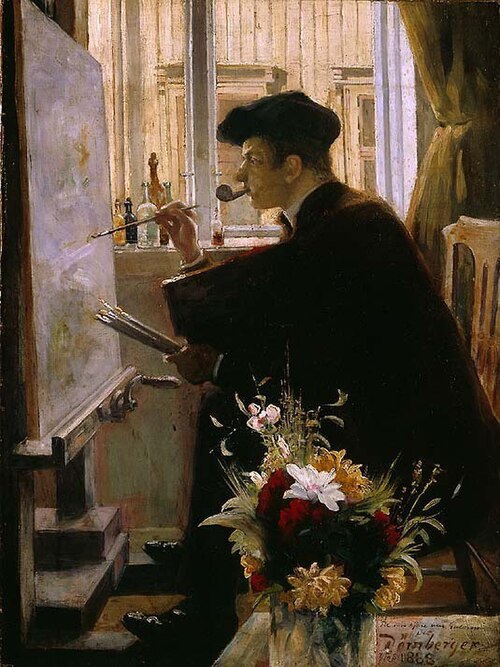The Universe and the Philosopher sat and looked at each other satirically. …
‘You know so many things about me that aren’t true!’ said the Universe to the Philosopher.
‘There are so many things about you that you seem to be unconscious of,’ said the Philosopher to the Universe.
* * *
‘I contain a number of things that I am trying to forget,’ said the Universe.
‘Such as what?’ asked the Philosopher.
‘Such as Philosophers,’ said the Universe.
‘You are wrong,’ said the Philosopher to the Universe, ‘for it is only by working up the most important part of yourself into the form of Philosophers that you get a product capable of understanding you at all.’
‘Suppose,’ said the Universe, ‘that I don’t care about being understood. Suppose that I care more about being?’
‘You are wrong again, then,’ said the Philosopher. ‘For being that is not conscious being can scarcely be called being at all.’
***
‘You Philosophers always were able to get the better of me in argument,’ smiled the Universe, ‘and I think that is one thing that is the matter with you.’
‘If you object to our intellects,’ said the Philosopher, ‘we can only reply that we got them, as well as everything else, from you.’
‘That should make you more humble,’ said the Universe. ‘If I quit letting you have intellect, where would you be then?’
‘Where would you be,’ asked the Philosopher, ‘if you quit letting me have intellect? If I quit thinking you out as you are, and must be, you would cease to exist as you are; for I am a part of you; and if I were to change, your total effect would be changed also.’ … Then the Philosopher reflected a long moment, and, warming to his work, put over this one: ‘The greater part of you, for all I know, exists in my brain anyhow; and if I should cease to think of that part, that part would cease to be.’
* * *
‘You make me feel so helpless, somehow!’ complained the Universe, hypocritically. ‘I beg your pardon for asking you to be humble a moment ago. … I see now, very plainly, that it is I who should be more humble in your presence.’
‘I am glad,’ said the Philosopher, ‘that we have been able to arrive at something like an understanding.’
‘Understanding!’ echoed the Universe. ‘It’s so important, isn’t it?’ … And then: ‘Come! We have argued enough for one day! There is something terribly fatiguing to me about Profound Thought. Can’t we just lie down in the shade the rest of the afternoon and watch the wheels go round?’
‘Watch the wheels go round?’ puzzled the Philosopher.
‘Uh-huh ! … the planets and solar systems, and stuff like that. The nicest thing in life, as I have lived it, is just to lie about and drowse and watch the wheels go round. … I made nearly everything spherical in the beginning so it would roll when I kicked it. I’d rather play than think.’
‘You are a Low Brow!’ said the Philosopher.
‘Uh-huh,’ said the Universe. ‘At times. … I suppose that’s the reason some of the children neglect the old parent these days.’
* * *
And then, after a nap, during which the Philosopher contemplated the Universe with a tinge of superiority, the Universe rumbled sleepily: ‘I know what I am going to do with this Intellect Stuff. I’m going to take it away from you Philosophers and give it to fish or trees or something of that sort!’
‘How frightfully grotesque!’ said the Philosopher, turning pale.
‘Or to giraffes,’ continued the Universe. ‘Giraffes are naturally dignified. And they aren’t meddlesome. I’d like to see a whole thousand of giraffes walking along in a row, with their heads in the air, thinking, thinking, thinking … with tail coats and horn-rimmed goggles.’
* * *
‘You are absurd!’ cried the Philosopher.
‘Uh-huh,’ said the Universe. And reaching over, the Universe picked up the Philosopher, not ungently, by the scruff of the neck, tossed him into the air, caught him tenderly as he came down, spun him around, and set him right side up on the ground.
‘You,’ said the Universe, grinning at the breathless Philosopher pleasantly, ‘are sort of funny yourself, sometimes!’

